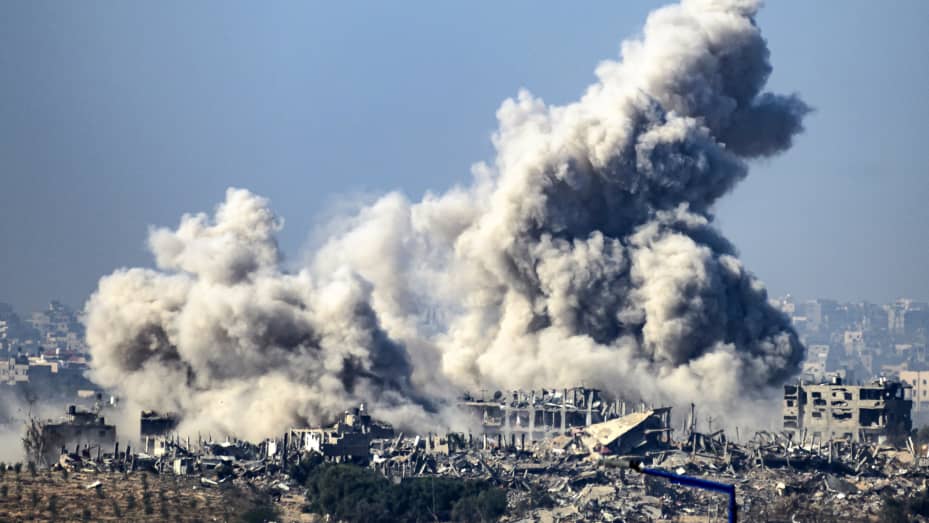
by Lev Tsitrin
Greek philosopher Thales of Miletus observed, some twenty-six centuries ago, that nothing is easier than giving advice — and the other day, Secretary Blinken did just that. During his visit to Israel, he said that “We discussed the details of Israel’s ongoing planning [for the war in Gaza] and I underscored the imperative for the United States that the massive loss of civilian life and displacement of the scale that we saw in northern Gaza not be repeated in the South,”
He listed practical steps “including” designation of safe zone for non-combatants, and not targeting critical infrastructure.
But did the full list of demands “include” anything else that was not mentioned publicly? Given a great deal of consternation over the kind of munitions Israel used in Gaza City to collapse Hamas’ tunnels (“Israel Used 2,000-Pound Bombs in Strike on Jabaliya, Analysis Shows” was the title of a panicked New York Times’ report), one wonders whether in his private meetings with Israelis Blinken “included” in his list a demand to limit the size of munitions. After all, the basis for New York Times‘ alarmed tone, and its decision to “analyze” that particular strike was, that “Hospital officials said that dozens of civilians were killed and hundreds wounded in the strike. Israel said it was targeting a Hamas commander and fighters, as well as the network of underground tunnels used by Hamas, the militant group that controls Gaza, to hide weapons and fighters. Israel’s use of such bombs, the second largest type in its arsenal, is not uncommon, and the size is generally the largest that most militaries use on a regular basis. They can be used to target underground infrastructure, but their deployment in a dense and heavily populated area like Jabaliya has raised questions of proportionality — whether Israel’s intended targets justify the civilian death toll and destruction its strikes cause.”
Which brought to my mind a memory from exactly twenty years ago (the more things change, the more they stay the same!): “an attempt to kill Sheikh Ahmed Yassin, the spiritual leader of Hamas, failed because the Israelis used a 113kg (250Ib) bomb rather than a one-tonne bomb on the building where he was expected to attend a meeting. Israeli intelligence believed that Sheikh Yassin was meeting associates on the third floor of the building, which the bomb destroyed, but as the meeting took place on the first floor he was uninjured.” A 2,000-pound bomb would have eliminated the entire political and military leadership of Hamas. A 250-pound bomb was just a wasted munition.
I am no military expert, but it should be obvious that given that underground infrastructure is by its nature hidden, and sturdily built, “erring on the side of caution” means using heavier, rather than lighter munitions. The New York Times measured the diameter of the crater, and was appalled by it, and tried to scare its readers — but it is the depth of the crater that really matters. Was it deep enough to kill “a Hamas commander and fighters” it targeted? Smaller bombs will hit a smaller area — but they may not do the job, just as what happened in that Gaza strike twenty years ago.
This is by no means a bloodthirsty observation, but just a commonsense one. Surely, the deaths of non-combatants in a war are regrettable — but regrets are the greater if only the non-combatants die in a strike, while the Hamasers walk away unharmed. Twenty years ago, there was much regret over that 250-pound bomb strike; there would have been no regrets if a 2,000-pound bomb was used.
This, I think, is the proper lesson to draw from in this war — and this should be the answer to all those who engage in the easy task of giving Israel advice while Israel is engaged in a very hard and bloody task of destroying Hamas and preventing further bloodshed.
- Like
- Digg
- Tumblr
- VKontakte
- Buffer
- Love This
- Odnoklassniki
- Meneame
- Blogger
- Amazon
- Yahoo Mail
- Gmail
- AOL
- Newsvine
- HackerNews
- Evernote
- MySpace
- Mail.ru
- Viadeo
- Line
- Comments
- SMS
- Viber
- Telegram
- Subscribe
- Facebook Messenger
- Kakao
- LiveJournal
- Yammer
- Edgar
- Fintel
- Mix
- Instapaper
- Copy Link








One Response
The Israeli bombardments are in COOPERATION6
with Hamas agents for aid in desired martyrdom and as balms on their way to Paradise.